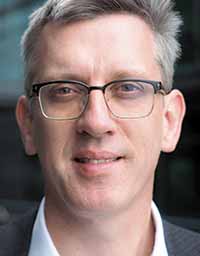Chief executive Laurent Denayer, whose regtech firm UME supplies the asset management industry with automated due diligence on fund distributors, talks to Bob Currie about mutualising information for collective advantage.
Management companies are required to conduct periodic due diligence on how distributors are marketing their funds. The second Markets in Financial Instruments Directive (MiFID II), for example, imposes EU-wide product governance requirements and obligations regarding the manufacture and distribution of products and services to end clients.
Under the Target market component of this regime, a management company must implement a product approval process that defines an identified target market of end clients for each financial instrument. It must be able to demonstrate that its distribution strategy is consistent with that target market and that all risks relevant to distributing to this target segment are assessed on an ongoing basis. More generally, management companies have an oversight obligation on the delegation of their distribution activity.
Questions and answers
Typically, this process involves sending out questionnaires, gathering in the responses, evaluating results, making follow-up calls to clarify gaps and then generating the associated reporting. The average time committed by management companies and global distributors may be 15-20 hours per fund distributor per annum. When aggregated across a management company’s full distribution network, this represents a large time commitment and cost.
 This is also a burden from a distributor’s standpoint. The distributor may receive hundreds of due diligence questionnaires from management companies over the year, each monitoring similar risks but using slightly different questions and formats.
This is also a burden from a distributor’s standpoint. The distributor may receive hundreds of due diligence questionnaires from management companies over the year, each monitoring similar risks but using slightly different questions and formats.
No consistent standardisation applies across this data-gathering exercise, meaning that distributors must spend time customising the same block of information to meet each management company’s specific requirements.
To streamline this process, regtech firm UME (pronounced ‘you-me’) proposes standardisation of information collection through the use of a single questionnaire. The management company can define a risk-based approach to its due diligence process, for example conducting evaluation of its “highest-risk” distributors annually and reviewing its low and medium-risk distribution agents less regularly.
Ume estimates that there are six layers of intermediation between a management company and the end investor, which can make it difficult to build a transparent, accurate view of their distribution network.
Although the information collection process becomes standardised, the management company can attach different weighting to different questions within the questionnaire, depending on its risk priorities.
By collating distributor information on a centralised platform, this has enabled ume to assemble a comprehensive global distributor database. “If an Asian fund manager wishes to distribute into a new European market, for example, or a Luxembourg-domiciled management company plans to extend sales into a new emerging market, we have a database of eligible distributors in our database that may fit their requirements,” says chief executive Laurent Denayer. These can be filtered according to a number of selection criteria.
Communitarian spirit
The principle in regtech, says Denayer, is that you should collaborate to compete. By mutualising information that provides little competitive advantage, it enables users to progress more rapidly, both as groups and as individual companies.
It has taken time for some management companies to adjust to this communitarian principle. But there may be a significant reduction in administrative overheads for those who are willing. “In October, we onboarded a new asset management client that was working to build its network to 60 distributors worldwide,” says Denayer. “The team lead was spending four days per week on this process, building contacts with new distributors and conducting periodic due diligence on those already in their network.
“On appointing our solution, they have now reduced this commitment to approximately four hours per week, enabling the company to reallocate this headcount and cost to value-creating functions”.
To create this facility, ume was established in 2017 with Laurent Denayer as chief executive officer and Oleksiy Shostak as chief technology officer. The platform was established between May and September 2017 and a prototype was ready to roll out to early adopters in October 2017. The company, which has its headquarters at the Luxembourg House of Financial Technology (see page 6), signed its first full client in January 2018. It now has information on its platform covering more than 1,500 distributors in over 55 jurisdictions.
©2019 funds europe





